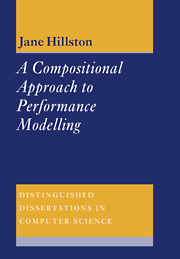
-
Select format
-
- Publisher:
- Cambridge University Press
- Publication date:
- November 2009
- June 1996
- ISBN:
- 9780511569951
- 9780521673532
- Dimensions:
- Weight & Pages:
- Dimensions:
- (247 x 174 mm)
- Weight & Pages:
- 0.29kg, 172 Pages
You may already have access via personal or institutional login
Book description
This is the first book presenting a stochastic extension of process algebra, PEPA; this is shown to be suitable for specifying a Markov process, which can then be applied to performance modelling. The method, which is illustrated with case studies taken from the area of communication systems, can readily be used to construct a variety of models that can be analysed using standard numerical techniques. One of the major advantages of PEPA over the standard methods for specifying stochastic performance models is the inherent apparatus for reasoning about the structure and behaviour of models. In the later chapters this apparatus is exploited to define four equivalence relations over PEPA components. Each of these notions of equivalence has intrinsic interest from a process algebra perspective. However, they are also demonstrated to be useful in a performance modelling context. To conclude the book, a section has been added surveying recent results in the area and discussing open questions.
Reviews
'Overall, a very useful addition to the perfomance modelling literature.'
Source: Zentralblatt MATH
Contents
Metrics
Altmetric attention score
Full text views
Full text views help Loading metrics...
Loading metrics...
* Views captured on Cambridge Core between #date#. This data will be updated every 24 hours.
Usage data cannot currently be displayed.
Accessibility standard: Unknown
Why this information is here
This section outlines the accessibility features of this content - including support for screen readers, full keyboard navigation and high-contrast display options. This may not be relevant for you.
Accessibility Information
Accessibility compliance for the PDF of this book is currently unknown and may be updated in the future.


